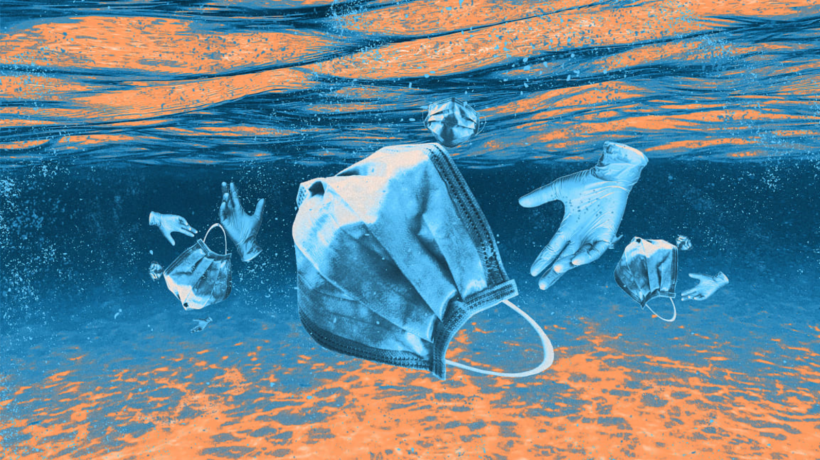It’s not news that our trash eventually finds its way to the ocean. Because oceans are downstream, litter will eventually find a pathway into our bodies of water if it’s not discarded properly—and often even if it is. But as the Covid-19 crisis slowly generates a new kind of waste, made up of disposable masks and other PPE items, it’s posing new problems for the Earth’s oceans. The flood of PPE could cause immediate danger to wildlife and long-term plastic pollution that threatens to contaminate food supplies.
It’s already emerging as a widespread problem, as masks, rubber gloves, and hand sanitizers have been found as far and wide as the coasts of France, the US., and Hong Kong, during voluntary beach cleanups. The numbers of collected PPE items aren’t yet astounding, but early anecdotal and visual observations have caused concern. While groups await more data, experts worry the coronavirus crisis may be alerting us to another emergency: Our poor waste management.
These are groups such as Surfrider, whose volunteers remove litter and debris from beaches regularly, and log the numbers of items they find as they go, which are then gathered and posted on Surfrider’s online database. So far, under the category of Covid Priority Items, the volunteers have picked up 23 disinfectant wipes, 23 gloves, and 12 masks.
While the early numbers aren’t staggering, they’re a signal of a global problem to come, especially because the items in question are essential gear that’s stocking up across the entire world. A June FEMA report announced that the agency had sent 149.2 million surgical masks, 14.3 million face shields, and over 1 billion gloves around the US. In April, France ordered 2 billion disposable masks from China.
In France, members of Opération Mer Propre, or Clean Sea Operation, go on frequent dives off the French Côte d’Azur around Antibes and Cannes, pulling items from the sea, and later posting images of their findings—still-intact disposable masks and water-filled rubber gloves they’d found on the seabed—on Facebook. Julie Hellec, the group’s spokeswoman, says the PPE items only account for 5% of total waste collected during these recent dives, but “we wish to alert the world that that could become 80% if we do nothing.”
There may be a shortage of toilet paper but there are piles of discarded face masks washing up on beaches in Hong Kong. This week, I spoke to Saanich researcher Teale Phelps Bondaroff about his work with OceansAsia, a nonprofit currently studying beach trash. 📷: Naomi Brannan pic.twitter.com/FmBoDSfHOT
— Devon Bidal (@devonscarlett) March 18, 2020
Those items are likely to become “a catastrophe for biodiversity,” Hellec says. Marine life of all kinds can get entangled in masks. For sea turtles, water-filled latex gloves resemble jellyfish, one of their prey, and ingesting them can lead to death from asphyxiation, or from starvation because their stomachs think they are full. OceansAsia, an advocacy group that investigates wildlife crimes, found a mountain of masks on Hong Kong’s Soko Islands in February, while the virus was rampant in Asia. Gary Stokes, a campaigner for the group, said that dolphins and porpoises are at risk of swallowing bundled masks.
Most of these items also contain some amount of plastic. Surfrider’s plastic pollution manager, Rachael Coccia, says most single-use masks contain polypropylene, a thermoplastic polymer, and that even cotton PPE items contain polyester, a plastic fiber. Most gloves are composed of nitrile, which contains plastic. These plastics remain in oceans for years, breaking down into microplastics, eaten by fish and plankton and eventually ending up in the food on our plates. Plastic bottles and disposable diapers, for instance, can last in some form for up to 450 years, according to the National Oceanic and Atmospheric Administration.
Ocean Conservancy, a nonprofit environmental advocacy group, also does an International Coastal Cleanup once a year in September, when a million volunteers all over the world take part; in 2018, they found 400,000 waste items. This year, its volunteers will be able to update the group’s online database, Clean Swell, with COVID-19-related items, too. Nick Mallos, senior director of its Trash Free Seas Program, is concerned that coronavirus waste will generate a new waste stream with its own set of problems. He worries that plastic waste accumulation could lead to increased standing water, creating new diseases altogether.
For Mallos, the Covid-19 crisis has exposed a global waste management crisis. Even if items are disposed of correctly, they may still resurface in the oceans due to mismanaged waste and sanitation. “This global pandemic is really highlighting just how critical proper waste collection and recycling is to our global society,” he says, “and how easily our systems can be overwhelmed by things like single-use plastics.”
Disposable masks count as single-use plastics because of their components. “There are ways to use these items in a sustainable manner,” says Surfrider’s Coccia, who says people should be using reusable masks instead. The government, she says, is responsible for producing better messaging on how to properly disinfect reusable masks so their use becomes common practice. Policymakers need to establish policies for this education, and to discourage the use of single-use masks and gloves.
In France, the first phase of a single-use plastic ban started on January 1 this year, but Hellec says single-use plastic PPE items have now undone some of that hard work. There, government action is also viewed as key. Eric Pauget, a politician representing the Côte d’Azur region, penned a letter to President Macron in May. “With a life span of 450 years, this equipment constitutes veritable ecological time bombs, given their lasting environmental consequences for our planet,” the letter read. “It is ultimately the implementation of an educational and dissuasive policy that must raise awareness to promote responsible behavior.”
Article originally published on fastcompany.com







